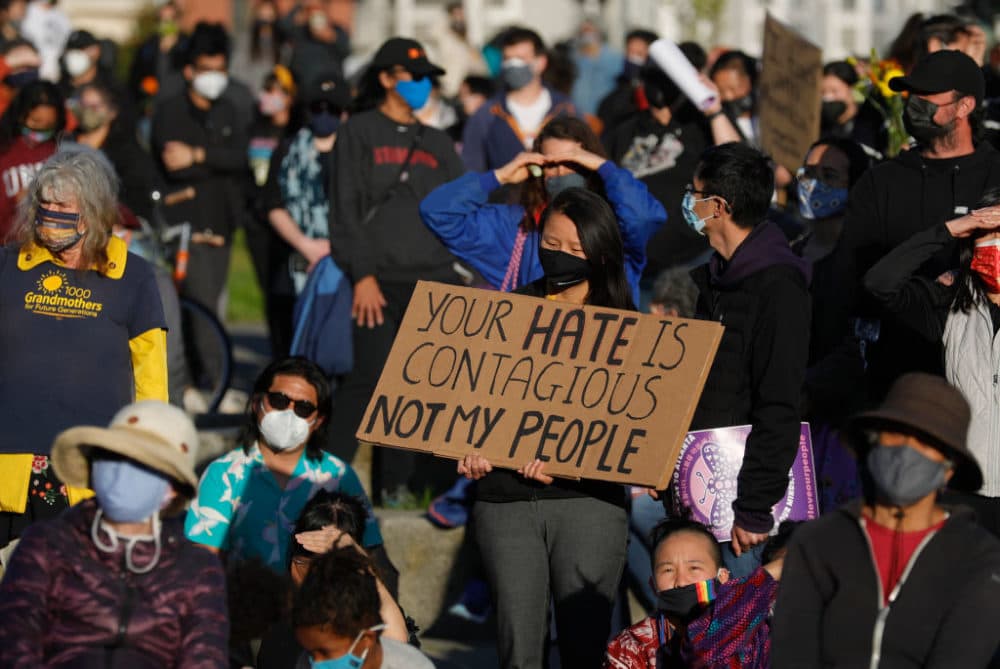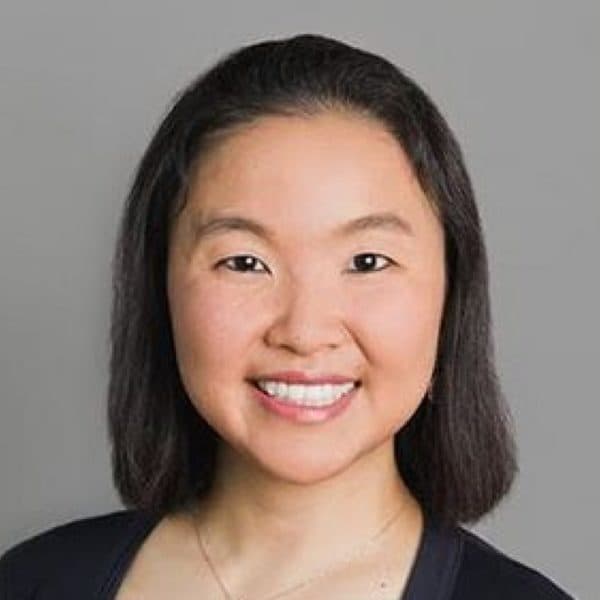Advertisement
Commentary
Hate Won't Be My ‘Background Noise.’ Not Anymore

A couple of years ago, before the pandemic, on a day that was a perfect mix of summer and fall, my husband and I set out to explore New England with our 9-month-old daughter. She giggled at a series of lobster sculptures in Plymouth, Massachusetts; we took pictures of her with each one, collecting snapshots of joy.
Then, I heard someone yelling.
It was a series of racial slurs spewed loudly out a car window. The person yelling was a boy, maybe 7 or 8 years old. He held his hands to the corners of his eyes to create slits; the same slits that kids used to mock me as a child.
There were two other boys in the backseat beside him; they were laughing and pointing, too. I’d heard those hurtful slurs many times before, but this time they were directed at my tiny child.
In an instant, it became clear to me that we weren’t just any other New England family: We were an Asian family and we didn’t belong. I remember feeling my hands shake and my heart pound. One thought seared into my mind: His words attacked my daughter.
Until that day, I’d often put my head down and acted as if I heard nothing when someone launched a racist or derogatory comment my way. But this time, my maternal instinct took over. I walked briskly to catch up with the car, which had stopped at a red light. I needed to know if the adult driving that car was going to be part of the problem — or part of the solution.
I’d often put my head down and acted as if I heard nothing when someone launched a racist or derogatory comment my way.
A man, who I presumed to be the boys’ father, was behind the wheel; the three boys in the backseat stopped grinning when they saw me coming.
“Your son just yelled racial slurs at my family,” I said.
The father turned his head sharply, “What? Which one?” I pointed out the boy and explained what had happened.
I felt my cheeks flush from the mess of anger and sadness at the world, for allowing children to express such hatred. I had so many questions about where this child had learned those slurs; I worried that this father would make excuses for him.
As the light turned green, I walked away from the car, back to my family. I thought that was the end of it. Then, a few minutes later, we heard a man’s voice: “Excuse me?”
The father had pulled his car over, and brought his son to speak with us. The boy’s eyes were cast down, welled up with tears. “I’m really sorry,” he said quietly.
“Look at that beautiful baby,” the father said, gesturing at my baby girl. “Look. We are all human. We are all the same.”
The father apologized again. He didn’t once tell me his family wasn’t a racist family. He didn’t make any excuses.
This encounter came rushing back to me in recent days, as news of anti-Asian hate crimes have been in the headlines. According to the California State University’s Center for the Study of Hate and Extremism, hate crimes targeting people of Asian descent surged 150% over the past year.
Maybe you’ve also seen the reports of elderly Asian men and women being brutally attacked. This has occurred on the very streets where I grew up in New York, and where my parents still live. It reminds me of my own grandparents, ambling along in our Chinatown, where they were comforted by familiar language, foods and sounds. To see vulnerable and respected elderly people in my community being blindsided by punches and blows to the head makes me feel sick.
Then, just last week a gunman opened fire on three Asian-owned businesses in Atlanta, killing eight people including six women who share immigrant stories similar to those in my family.
Racist violence isn’t new; and the feelings I’m having now aren’t new either. When I was a child, my own father was beaten over a traffic incident: his assailant cited my father's race as part of his motive. It is clear that our lives have been and continue to be under threat.
To see vulnerable and respected elderly people in my community being blindsided by punches and blows to the head makes me feel sick.
Asian Americans also face smaller, but no less damaging, acts of racism every day. There are the casual slurs, the hyper sexualization of women, the assumption about our abilities, the questioning of our origin. We have been “othered” for so long. These aggressions have become the background noise of normal life.
The spotlight on the recent attacks means more people are aware of these issues, but confronting racism can be exhausting. When I was a medical student, I suggested to a patient that his sexist and racist comments were inappropriate — and he told me to not be so sensitive. That’s a pattern. Our concerns are often diminished, and we get tired, quiet.
That’s why I’m thinking about that day in Plymouth. It’s a reminder of my own power, as much as it is a reminder of what’s possible. When I spoke up for my family, I found an ally where I didn’t expect to. That boy’s father was willing to call out racism without qualifiers or excuses — even when it was his own son.
When hate leaves me feeling exhausted and helpless, I’ll think about that encounter. It helps to know that sometimes speaking up feels worth it. Hate won’t be background noise to me anymore; I want to denounce it unequivocally.
